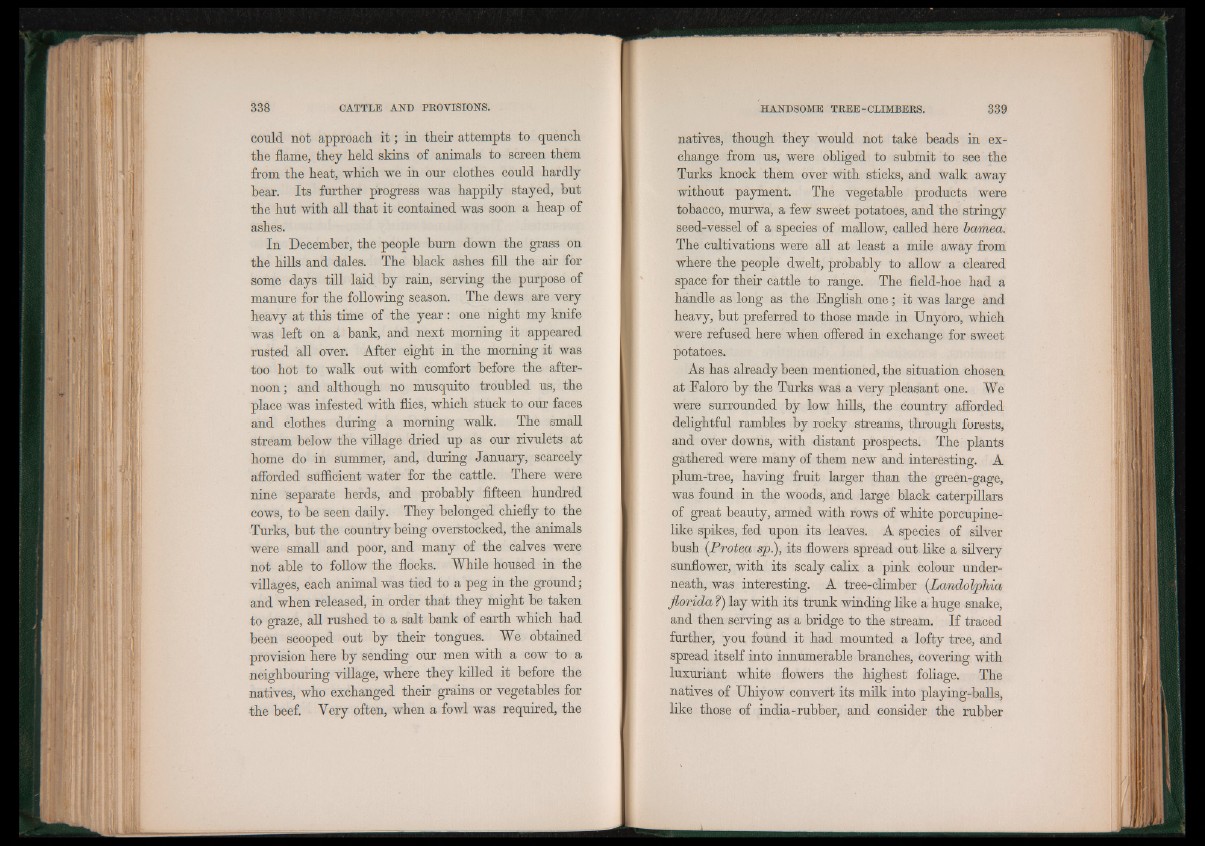
could not approach i t ; in their attempts to quench
the flame, they held skins of animals to screen them
from the heat, which we in our clothes could hardly
hear. Its further progress was happily stayed, hut
the hut with all that it contained was soon a heap of
ashes.
In December, the people burn down the grass on
the hills and dales. The black ashes fill the air for
some days till laid by rain, serving the purpose of
manure for the following season. The dews are very
heavy at this time of the year: one night my knife
was left on a bank, and next morning it appeared
rusted all over. After eight in the morning it was
too hot to walk out with comfort before the afternoon;
and although no musquito troubled us, the
place was infested with flies, which stuck to our faces
and clothes during a morning walk. The small
stream below the village dried up as our rivulets at
home do in summer, and, during January, scarcely
afforded sufficient water for the cattle. There were
nine separate herds, and probably fifteen hundred
cows, to be seen daily. They belonged chiefly to the
Turks, but the country being overstocked, the animals
were small and poor, and many of the calves were
not able to follow the flocks. While housed in the
villages, each animal was tied to a peg in the ground;
and when released, in order that they might be taken
to graze, all rushed to a salt bank of earth which had
been scooped out by their tongues. We obtained
provision here by sending our men with a cow to a
neighbouring village, where they killed it before the
natives, who exchanged their grains or vegetables for
the beef. Very often, when a fowl was required, the
natives, though they would not take beads in exchange
from us, were obliged to submit to see the
Turks knock them over with sticks, and walk away
without payment. The vegetable products were
tobacco, murwa, a few sweet potatoes, and the stringy
seed-vessel of a species of mallow, called here bamea.
The cultivations were all at least a mile away from
where the people dwelt, probably to allow a cleared
space for their cattle to range. The field-hoe had a
handle as long as the English one; it was large and
heavy, but preferred to those made in Unyoro, which
were refused here when offered in exchange for sweet
potatoes.
As has already been mentioned, the situation chosen
at Ealoro by the Turks was a very pleasant one. We
were surrounded by low hills, the country afforded
delightful rambles by rocky streams, through forests,
and over downs, with distant prospects. The' plants
gathered were many of them new and interesting. A
plum-tree, having fruit larger than the green-gage,
was found in the woods, and large black caterpillars
of great beauty, armed with rows of white porcupinelike
spikes, fed upon its leaves. A species of silver
bush (Protea sp.), its flowers spread out like a silvery
sunflower, with its scaly calix a pink colour underneath,
was interesting. A tree-climber (Landolphia
Jlorida f) lay with its trunk winding like a huge snake,
and then serving as a bridge to the stream. If traced
further, you found it had mounted a lofty tree, and
spread itself into innumerable branches, covering with
luxuriant white flowers the highest foliage. The
natives of Uhiyow convert its milk into playing-balls,
like those of india-rubber, and consider the rubber